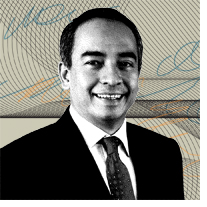This content is from:Home
Nazir Razak
With many global banks retreating from Southeast Asia to focus on China and India, local players are stepping into the breach. Nazir Razak wants to put Malaysia’s CIMB Group Holdings at the head of the pack.

With many global banks retreating from Southeast Asia to focus on China and India, local players are stepping into the breach. Nazir Razak wants to put Malaysia’s CIMB Group Holdings at the head of the pack.
Short, affable and driven, Nazir, 43, has a pedigree that marked him for success. His father, Abdul Razak, was Malaysia’s second prime minister and author of the New Economic Policy, an economic affirmative action program that favored the country’s majority Malays over ethnic Chinese. His eldest brother, Najib Razak, was named prime minister in April 2009.
Nazir was only nine when his father died of leukemia, in 1976; he remembers being shipped off to a boarding school in England four and a half years later, at the age of 13. He eventually earned a bachelor’s degree in political science and economics at the University of Bristol and a master’s in economic development at Cambridge University.
纳齐尔返回home in 1989 to take an entry-level position in the corporate advisory unit of then-fledgling investment bank CIMB. He rose quickly through the ranks, helping manage fundraisings, privatizations, new listings and corporate restructurings. He led the team that took state-controlled power utility Tenaga Nasional public in a $1.2 billion deal in 1992, at the time Malaysia’s biggest IPO. After a stint in CIMB’s stockbroking arm, he went back to the investment bank as deputy CEO in 1996 and became CEO in 1999.
Under his stewardship, CIMB became the country’s premier investment bank, developing a dominant share of the market for M&A advisory services and equity underwriting, and expanding into bond underwriting and trading. CIMB is also a leader in the global sukuk, or Islamic bond, market.
In 2006, Nazir pushed through a merger with CIMB’s parent, the commercial bank Bumiputra-Commerce. The following year he bought out local retail lender Southern Bank. Today the group’s banking subsidiary, CIMB Bank, boasts the country’s second-largest retail and commercial banking franchise.
In effect, Nazir has built the Malaysian equivalent of JPMorgan Chase & Co. “What we are trying to do is build a universal bank with both retail and corporate and investment banking business,” he says.
Now that CIMB has grown big at home, Nazir is eager to make it a regional powerhouse. CIMB has been on a buying spree since 2005, acquiring Bank Niaga and Bank Lippo in Indonesia, BankThai in Thailand and a Singapore-based investment banking outfit, GK Goh.
The ten-member Association of Southeast Asian Nations has a population of 500 million people, a gross domestic product of more than $700 billion and a growth rate of more than 6 percent a year. “It’s not China or India but a big enough market in its own right,” says Nazir. “You still have low banking penetration and nascent capital markets, which allows us the opportunity to grow our universal banking model.” Eventually, the hard-charging banker intends to elbow his way into China and India.
Return to the index and article,Asian Financiers Flex Their Muscles.
Click here to view the complete rankings of theCaptains of Asian Finance.
